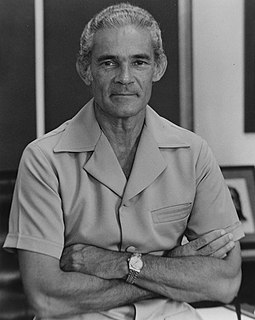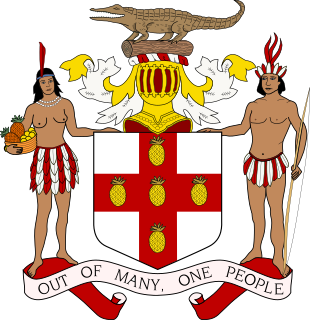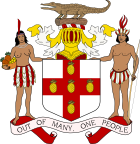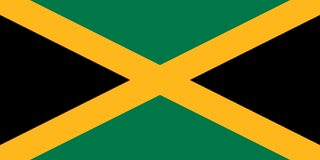
Michael Norman Manley ON OCC was a Jamaican politician who served as the fourth Prime Minister of Jamaica from 1972 to 1980 and from 1989 to 1992. Coming from a prosperous background, Manley was a democratic socialist. According to opinion polls, he remains one of Jamaica's most popular prime ministers.

The Prime Minister of Jamaica is Jamaica's head of government, currently Andrew Holness. Holness, as leader of the governing Jamaica Labour Party (JLP), was sworn in as Prime Minister on 3 March 2016, succeeding People's National Party (PNP) leader Portia Simpson-Miller. This was a result of the JLP's victory in Jamaica's 25 February 2016 general election.

The National Democratic Movement (NDM) is a conservative political party in Jamaica, led by Peter Townsend.

Orette Bruce Golding is a former Jamaican politician who served as eighth Prime Minister of Jamaica from 11 September 2007 to 23 October 2011. He is a member of the Jamaica Labour Party which he led from 2005 to his resignation in 2011.

Elections in Jamaica provides information on elections and election results in Jamaica.

Portia Lucretia Simpson-Miller,, is a Jamaican politician. She served as Prime Minister of Jamaica from March 2006 to September 2007 and again from 5 January 2012 to 3 March 2016. She was the leader of the People's National Party from 2006 to 2017 and the Leader of the Opposition twice, from 2007 to 2012 and from 2016 to 2017.

The Saint Lucian general election of 2006 took place in Saint Lucia on 11 December 2006. The election was fought between the Saint Lucia Labour Party (SLP) and the United Workers Party (UWP) which between them dominated politics in Saint Lucia. The results saw the governing Saint Lucia Labour Party lose the election to the United Workers Party led by John Compton, which gained eight seats to hold an eleven to six majority.

Early general elections were held in Jamaica on 15 December 1983. The election was boycotted by the main opposition party, the People's National Party, in protest at the refusal of the ruling Jamaican Labour Party to update the electoral roll. Whilst several minor parties participated in the election, most seats were unopposed: in the six seats where voting took place, voter turnout was about 55%, so this translated into a nationwide figure of 2.7%. It allowed the Labour Party to win all 60 seats in the House of Representatives, with their leader, Edward Seaga, continuing as Prime Minister.

General elections were held in Jamaica on 18 December 1997. The ruling People's National Party of Prime Minister P. J. Patterson won 50 of the 60 seats defeating the main opposition Jamaica Labour Party.

Andrew Michael Holness, ON, MP is a Jamaican politician who has been the Prime Minister of Jamaica since 3 March 2016, following the 25 February 2016 general election. Holness previously served as Prime Minister from October 2011 to January 5, 2012. He succeeded Bruce Golding as Prime Minister, and decided to go to the polls in the 29 December 2011 general election in an attempt to get his own mandate from the Jamaican electorate. He failed in that bid, however, losing badly to the People's National Party led by Portia Simpson-Miller, with the PNP gaining 42 seats to the Jamaica Labour Party's 21. Following that defeat, Holness served as Leader of the Opposition from January 2012 to March 2016, when he once again assumed the position of Prime Minister.
The Jerusalem Bread Foundation was a minor political party in Jamaica.

The 2011 Jamaican general election was held on 29 December 2011 in Jamaica. The election was contested mainly between the nation's two major political parties, the governing Jamaica Labour Party (JLP), led by Andrew Holness, and the Portia Simpson-Miller-led opposition People's National Party (PNP). The result was a landslide victory for the PNP which won 42 of the 63 seats, a two-thirds majority.

General elections were held in Jamaica on 25 February 2016. The elections were largely a contest between the governing People's National Party (PNP) and the opposition Jamaica Labour Party (JLP). The result was a narrow victory for the JLP, which won 32 of the 63 seats. One political commentator described the poll as "the closest election Jamaica has ever had".
The 2012 Jamaican Local Government Election was held on 26 March 2012 in Jamaica. Directly elected were 228 divisional councillors and the mayor of the municipality of Portmore. Each of the 13 parish councils and parish capital mayoral positions were allocated to a political party. The election was contested mainly between Jamaica's two major political parties, the Portia Simpson-Miller-led People's National Party (PNP), the opposition, and the Andrew Holness-led Jamaica Labour Party (JLP), which currently forms Jamaica's government.

Federal elections were held in the West Indies Federation for the first and only time on 25 March 1958. The result was a victory for the West Indies Federal Labour Party, which won 25 of the 45 seats in the House of Representatives.

Republicanism in Jamaica is a position which advocates that Jamaica's system of government be changed from a constitutional monarchy to a republic. Both major political parties – the Jamaica Labour Party and the People's National Party – subscribe to the position, and the current Prime Minister of Jamaica, Andrew Holness, has announced that transitioning to a republic will be a priority of his government.
The Jamaican political conflict is a long standing feud between right-wing and left-wing elements in the country, often exploding into violence. The Jamaican Labor Party and the People's National Party have fought for control of the island for years and the rivalry has encouraged urban warfare in Kingston. Each side believes the other to be controlled by foreign elements, the JLP is said to be backed by the American Central Intelligence Agency and the PNP is said to been backed by the Soviet Union and Fidel Castro.










